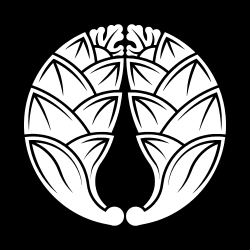Definify.com
Definition 2026
茗荷
茗荷
Japanese

Pronunciation
Alternative forms
- 蘘荷 (rare)
Noun
茗荷 (hiragana みょうが, katakana ミョウガ, romaji myōga, historical hiragana めうが)
- myoga or Japanese ginger (Zingiber mioga), of which only the shoots and flower buds are used in cooking
- a dimwit, an idiot, a stupid person (from a folk belief that excess consumption of myoga causes forgetfulness)
- a kind of 家紋 (kamon, “family crest”)
Usage notes
As with many terms that name organisms, this term is often spelled in katakana in biological contexts, as ミョウガ.
Derived terms
Etymology 2
| Kanji in this term | |
|---|---|
| 茗 | 荷 |
|
め Hyōgaiji |
が Grade: 3 |
| Irregular | |
From Old Japanese. Some sources[1][2][3] mention that this might be a compound of 芽 (me, “sprout”) + 香 (ka, “fragrant”). However, the semantics are backwards compared to most other Japanese compounds. In addition, this term appears in writings of the Nara period with the spellings 女我 and 売我.[1] The me syllable here is spelled phonetically with the so-called Type-A or 甲類 (kōrui) reading of e1, but 芽 in Old Japanese had the Type-B or 乙類 (otsurui) reading of e2. These two different e phonetic values were distinct in Old Japanese, indicating that 芽 (me, “sprout”) + 香 (ka, “fragrant”) is not the actual derivation.
(For more details on Old Japanese spellings and phonetic values, see ![]() Jōdai Tokushu Kanazukai on Wikipedia.Wikipedia )
Jōdai Tokushu Kanazukai on Wikipedia.Wikipedia )
This reading is obsolete in modern Japanese.
Pronunciation
- (Irregular reading)
- IPA(key): [me̞ɡ̃a̠]
Alternative forms
- 蘘荷 (rare)
Noun
茗荷 (hiragana めが, romaji mega)
- (obsolete) myoga or Japanese ginger (Zingiber mioga)
References
- 1 2 3 4 1988, 国語大辞典(新装版) (Kokugo Dai Jiten, Revised Edition) (in Japanese), Tōkyō: Shogakukan
- 1 2 3 2006, 大辞林 (Daijirin), Third Edition (in Japanese), Tōkyō: Sanseidō, ISBN 4-385-13905-9
- 1 2 3 1995, 大辞泉 (Daijisen) (in Japanese), Tōkyō: Shogakukan, ISBN 4-09-501211-0
- ↑ 1998, NHK日本語発音アクセント辞典 (NHK Japanese Pronunciation Accent Dictionary) (in Japanese), Tōkyō: NHK, ISBN 978-4-14-011112-3
